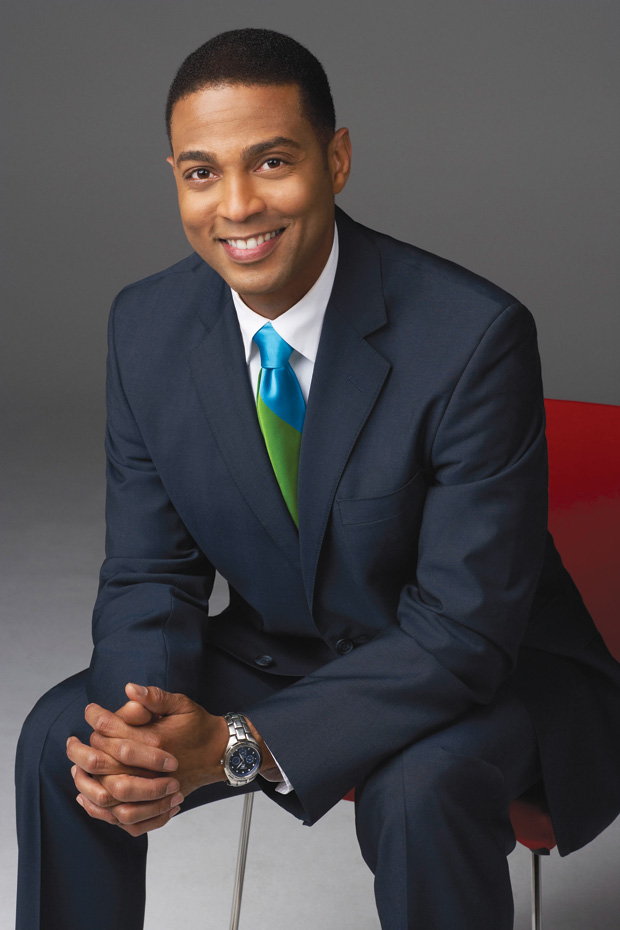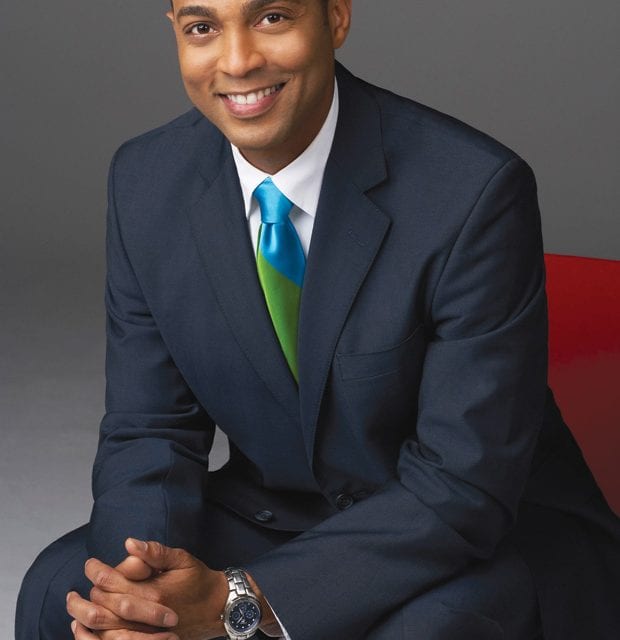CNN anchor dishes on racism in the LGBT community, assignments from Sandy Hook to the inauguration in advance of Denton visit next week

FREE AT LAST | Don Lemon said he accepted the invitation to speak at UNT because it’s the 150th anniversary of the Emancipation Proclamation and he was inspired by the theme, ‘Journey to Freedom.’
Don Lemon has been at CNN since 2006. He’s the network’s weekend primetime anchor and serves as an on-the-scene reporter during the week.
In 2011, in conjunction with the release of his book Transparent, Lemon came out publicly, although he had been out in his private life and to his colleagues.
He sat down with Dallas Voice this week in advance of his appearance at the University of North Texas’ annual Equity and Diversity Conference, which he’ll keynote on Feb. 1.
Dallas Voice: Why did you decide to speak at the Equity and Diversity Conference in Denton next week?
Don Lemon: I thought it was important with the 150th anniversary of the signing of the Emancipation Proclamation. I look at all of the requests that I get and weighing the theme “Journey to Freedom” in honor of signing the Emancipation Proclamation” — and I love talking to students.
DV: You’ve said that you were out at CNN long before being out publicly. Was that a difficult balancing act and was there resistance to your announcement from management?
D.L.: It was a difficult balancing act. I probably had to choose my words. Instead of “he,” I’d say “they” or I just didn’t say much around people I didn’t know. But for the people I was friendly with and people who knew other people I knew, they knew that I was gay. It wasn’t something I’d hide.
It was something I didn’t talk about. As far as any resistance from CNN management? None. I’ve had overwhelming support from CNN.
When I told one of my bosses, he said, “I know that.” At the time I was seeing someone in the company and he said, “I know that and he’s a great guy” and it was never an issue.
DV: You were at the inauguration. Other than meeting Cyndi Lauper, what were the highlights?
D.L.: The highlight for me was being out there and meeting the people who were there from all over the country and all over the world.
It wasn’t about the celebrities. The best part for me was just to be out and hang with the crowds.
DV: Tell me about the response to Obama’s speech you got from those two gay guys.
D.L.: It wasn’t just those guys, it was everyone standing around us. They went “Whoa! Did you hear that? He mentioned Stonewall, he mentioned love between people of the same sex. He mentioned gay people.” We were all “Wow! That’s huge.”
We were all pretty stunned, even though we knew he’s a supporter of same-sex marriage, but no president has ever mentioned that in an inaugural address. So to have that mentioned was pretty historic.
DV: As a black, gay man from the South, how did you feel about Obama equating Selma to Stonewall?
D.L.: The two movements are different, but the same. One is for people of color and one is for people of the same sex who want their love to be seen as legitimate and the same as everyone else. We know they’re not exactly the same. But the fight and crusade for equal rights and civil rights are exactly the same.
John Lewis, the civil rights leader, has said to me, and leaders up on stage during the inaugural address said — that issue as far as this president and John Lewis are concerned — that’s settled. Gay rights are the same as civil rights. It is the same struggle. For me, it’s a settled issue.
People see that I’m black before they know I’m gay. Sometimes they don’t know that I’m gay. But it’s the same issue and the same struggle.
DV: In your book, you address racism in the black community. Have you experienced racism in the gay community?
D.L.: Yes. Absolutely. I went out for drinks with friends when I was there [in Washington] and we went to a bar and the black people were on one floor and the white people were on another floor.
I hear some of my friends who say “I don’t date white guys.” Or some of my friends will say, “I don’t date black guys.”
I’ve gone to events and I’ve been the only person of color in the room and the only reason I’m there is I’m emceeing the event or I’m getting an award or because I’m the guy on television.
What does that say when there’s only one person of color in the room?
It has to do with a manner of thinking. And just because we’re gay people doesn’t mean that we can’t be prejudiced or biased or that we don’t need to open our minds more.
DV: Tell me about your reporting on AIDS in Africa, which you won one of your earliest awards for.
D.L.: I pitched AIDS stories for years. I pitched it with the network and then with my local station and there was not much interest in it. You understand, it’s a business and some things get on and some things don’t.
There was a learning curve but it was something I am very passionate about. I decided to spend my own money and took my vacation. And because I couldn’t tell it in my own community, I went halfway around the world and brought it back to my community. I related it in a way that we take care of people in our community, especially African-Americans who are dying in rapid and increasing numbers.
DV: Was Newtown the hardest story you’ve reported? Talk about your on-air appeal for gun control while reporting from Connecticut.
D.L.: It wasn’t advocacy. It was being a human. I’ve always said we are human beings before we are reporters.
So to be in the middle of that covering it from the very beginning all the way through the funerals, one could not be struck without emotion and feelings that were going on there.
I was feeling what most people around the country were thinking in their own living rooms, that we as a country need to get a grip on these sort of shootings. We have issues when it comes to gun violence in this country and we need to talk about it.
DV: Is there room on cable news to do more than just report but to express how you’re feeling?
D.L.: Certain stories you can do that. Hurricane Katrina was one of them. “I know that you’re saying, Mr. Government Leader, that this is happening, but we’re here on the ground and it’s not happening.”
Especially given how much real estate we have on a 24-hour cable network, yeah. There’s an opportunity not only for that but to give more of the truth because we’re not working with a 22-minute news hole.
DV: Do you get pressure from different sides to tone that down?
D.L.: David, as a gay, black man, I get pressure from everybody. I get pressure from the left, from the right, from the gun enthusiasts, from the people who don’t like guns because I believe in telling the truth. For the truth, there is no right, there is no left. There’s only the truth. I don’t live by any concern or worry for pressure. I live only with the challenge that when I’m on television, the American people deserve to have the truth.
DV: During your “No Talking Points” segment, you compared Mitt Romney’s position on same-sex marriage to George Wallace’s position on race. Is it sometimes difficult to remain fair and balanced?
D.L.: When someone says marriage is between one man and one woman, I imagine what that will sound like in 40 or 50 years. I’m offering you the opportunity to think about it. I’m not saying that will sound like George Wallace. I’m just giving you the opportunity to think about it.
And that’s not my slogan to be fair and balanced. My thing is about accuracy and the truth. Just because someone has another point of view or opinion, I don’t believe in false fairness. I just believe in the truth.
Equity and Diversity Conference, University Union, 155 Union Circle, Denton. Feb. 1 at 8:30 a.m. Students free, UNT faculty, staff and alumni $50. Non-UNT participants $150. https://Edo.unt.edu.
This article appeared in the Dallas Voice print edition January 25, 2013.
















